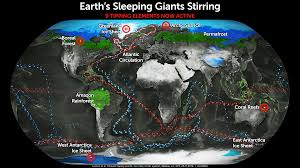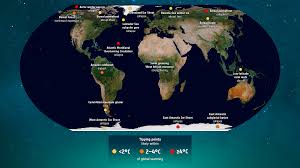Human Impact on Climate
Continuous Change
Every moment of every day, we humans reconfigure Earth’s climate. We create hotter summers and wetter storms. We raise sea levels and intensify wildfires. Each action turns the dial on numerous threats to our homes, societies, and environment. Planet’s Climate Tipping Points.
Alarm Bells Ringing
For the past two decades, scientists have raised alarms about critical natural systems. They warn that warming from carbon emissions might push these systems toward collapse. These vast systems can maintain balance even as temperatures rise, but only to a point.
The Tipping Point

Once we warm the planet beyond certain levels, this balance may vanish. Scientists assert that the effects would be sweeping and hard to reverse. It resembles flipping a switch rather than merely turning a dial—one that cannot easily revert.
Coral Bleaching
When corals turn ghostly white, they often survive. Too much heat in the water causes corals to expel their symbiotic algae. If conditions improve, corals can endure this bleaching. Over time, reefs can bounce back.
Escalating Threats
However, as the world warms, occasional bleaching becomes regular. Mild bleaching evolves into severe bleaching. Scientists predict grim outcomes. Even with swift action to curb global warming, 70 to 90 percent of today’s reef-building corals could perish in the coming decades. If we fail to act, that toll could rise to 99 percent or more.
The Illusion of Health
A reef may appear healthy until its corals begin to bleach and die. Eventually, it transforms into a graveyard. This does not necessarily mean reef-building corals will go extinct; hardier ones might survive in pockets. Yet, the vibrant ecosystems they support will become unrecognizable.

The Future Landscape
We face a harsh reality: there is no bouncing back anytime soon. Not in the places corals inhabit today and not at any scale. The ongoing changes challenge our understanding of resilience and recovery in a warming world.
